A Walk Between Two Poutines with Scaachi Koul
"Everyone I know is a different person and, I don’t know—are we all still going to like each other?"
“Can’t you see how homesick I am? It’s embarrassing.”
Scaachi Koul and I are eating poutine at Pomme Frites in Greenwich Village. The dish is “a bit peppery” and Scaachi is worried about “the viscosity of the gravy,” but overall it’s “fine” and “is actually poutine.”
“At least it’s not disco fries,” Scaachi says between bites. “You Americans like to simply shred some cheddar cheese on fries and call it poutine like a bunch of monsters. Is this good poutine? No. But is it better than any other poutine I’ve had in the U.S.? Yes. Aside from Wisconsin.” She takes another bite. “The curds don’t squeak, though. But the fries are good. I’d eat those again.”
We finish our poutine and point ourselves toward Brooklyn. There’s a Montreal-style delicatessen called Mile End that’s rumored to have delicious smoked meats and top-rate poutine. That’s what we’re on the hunt for. Good poutine. Comfort food. Or, to put it differently, something that will remind Scaachi of home.
It’s one of those perfect summer evenings that seem to be made especially for New York City. The streets are packed with fashionable Manhattanites, not-so-fashionable tourists, and boisterous NYU students heading out to meet their Friday night adventures.
We take our drinks with us (may to-go cups never die), and will stop at The Flower Shop along the way. There the waitress will give us a couple of free shots and Scaachi will start to cry. But we don’t know that yet. For now, Scaachi simply points at her feet and says, “These are the only flats I own, by they way.” When I don’t respond she rolls her eyes and sighs, “I can’t believe you’re making me walk.”
Isaac: Why do you choose violence?
Scaachi Koul: In what context?
I: All of them.
SK: I don’t choose violence. Everybody else is just weak. But seriously, I’m not choosing violence. Other people are coming to me and giving me two options. You come to me and you hand me two plates, right? One plate has nothing on it, and the other has a knife on it. And you’re also holding a knife. Do you think I’m going to take the plate with nothing on it?
I: To be clear, there are no knives nor plates here.
SK: Not you, specifically, dummy. I’m talking about the grand “You.” If somebody sends me a shitty email, or is a piece of shit on Twitter, you’re coming to me with a knife. When people choose to do violence in my air space, am I supposed to just sit there? No. So I’m not choosing it. I’m merely responding back with the same energy.
I: Were you always assertive?
SK: My family was. They were aggressive. And I was the youngest, and remained the youngest until my niece was born eleven years ago. So I was the baby until my 20s. But I realized at a young age that you can get away with so much if you’re a little bossy. If you talk with authority. Or—to put it another way—if you punch somebody in the face, but after you hit them your bowtie spins and water spurts out of it and some people laugh, then you can get away with punching somebody in the face.
I: How old were you when you realized that?
SK: Twelve.
I: And how old were you when you started writing?
SK: Twelve.
I: What were you writing?
SK: I wrote re-imaginations of well known fairy tales. Such as, “What happens when Cinderella goes home with the prince and it turns out she fucking hates him because they’ve never really spent time together before?” I was good at english in junior high—it was my only skill. I was extremely bad at everything else. And then in high school I started working at the school newspaper and then I went to journalism school and then I did my damnedest to start my career.
Isaac: Which you did. And now you’re a culture writer. Did you envision a world where your reporting would cause so much conflict?
SK: I always expected reporting on neo-nazis or shitty libertarians to bring out a lot of anger, but I’m always surprised how much vitriol there is in the influencer community. Influencers don’t operate like normal people, and there is a tremendous amount of entitlement within the influencer community. It’s really challenging to report on people who don’t need a journalist to tell their story, and often resent the very journalists who are interested in them.
I have received more online abuse from the stans of prominent influencers than I have when I write about politics, gender, or race (albeit those are also very important themes within the influencer community, of course). Influencers want to have full control over their story, and then their fans will only listen to that. So you get 15,000 people angrily responding to your tweets and emailing you nonstop after you post a story.
I: What is it that interests you about influencers? What will draw your attention to a particular influencer?
SK: The thing that interests me most is if they have any self awareness. Because influencers who are self aware intrigue me. If they aren’t self aware, then it’s a wash. Because most influencers don’t want to talk to media. There’s a reason why you rarely see big glossy interviews with influencers. Because they don’t need it. They can talk to me and I can get a couple of million people to read the piece if I’m lucky, or they can make a YouTube video and have 40 million people watch it six times.
I: Ok, so you never run from a fight. Or, as you put it, you love to punch people in the face and then have your bowtie spin and water spurt out of it. But you also care deeply about your friends. What is it about friendship that is important to you?
SK: I make space for my friends. But that’s the key. My friends. My people. The rest of you can go fuck yourselves. Of the 7 or 8 billion people on the planet I love about, what? Ten or so? Proportionately I don’t think that’s impressive. But I do make space for those dozen people. Because found family is important. They take care of you when your own family can’t get to you. Or you won’t let them get to you. Or they aren’t around to get to you at all. How else would anybody survive? Nobody in New York is alive without having found family.
I: That said, actual family is very important to you too.
SK: It didn’t used to be. I was very resentful of my family when I was younger. I barely spoke to them. But the funny thing about Indian parents—I used to say this when I was on book tour. Brown girls would come up to me and say, “I have a boyfriend, how do I tell my dad?” And I would respond, “Are you sure you want to? Because it’s going to be a process. But if you want to, go ahead.” But I would always say, “Your parents are like spiders. They are way more afraid of you than you are of them. And 99% of the time they will not be able to maintain whatever bullshit silent treatment they’re threatening you with. Because they can’t take it. They will bend.”
I: What has the last year and a half been like, not being able to get to your family?
SK: Oh, it’s hell. It sucks.
I: When was the last time you saw them?
SK: I last saw them in January of 2020. In March of 2020 we were all supposed to go to India. My parents left before us—they were there for two weeks. And then my visa to go to India was refused. And India wouldn’t give us a reason but—well, my husband’s was approved. He’s white. I’m Kashmiri. And we were trying to go to Kashmir. So they wouldn’t let me go, and I think it’s because I wrote something critical of the Indian government. Anyway, I couldn’t go to India, and I had to have this brutal phone call with my parents where I told them we weren’t coming. And then the next week COVID shut everything down.
So my parents, who are morons. I want that on the record. My parents are ding dong dummies. They refused to leave the country—were convinced it wasn’t a big deal—and then naturally got stuck in India for three and a half months. No healthcare. My mother had run out of her medicine for multiple different ailments. One silver lining story is that I eventually took to Twitter to try and get my mom some of the medication she needed. Luckily some person knew someone who knew someone who knew someone who drove to my uncle’s house in the middle of nowhere in Kashmir and dropped off a few of the meds that my mom needed. It was a miracle.
But they were there for months. I have no more favors left to ask of the Indian Canada consulate. They will never talk to me again, because I basically called them constantly and made their lives hell. But they eventually got my parents a repatriation flight in June of 2020. So at least they’re home.
I: But you still haven’t been able to see them?
SK: No. I’m in greencard hell.
I: So it’s not COVID.
SK: It’s not COVID. Now it’s the U.S. Government.
I: Is this the longest you’ve gone without seeing your family?
SK: Oh, yeah. It’s hard. It’s been a long time. They’re old too, right? When you think about it—for example, the last time I saw my niece she was nine. Now she’s eleven. My friend had a baby and that baby is now one. Her other child talks, which—I don’t remember that happening. One of my friends got a divorce. Another one is now rapturously in love. Everyone I know is a different person and, I don’t know—are we all still going to like each other? What if we don’t? Sometimes you don’t. That happens. Maybe we won’t like each other and that’s going to be very uncomfortable. We’ll see.
I: How do you think you’ve changed in the past year?
SK: This is the nadir of my mental health. This is the worst version of myself that I’ve ever been.
I: You’re feeling low?
SK: Listen. I think everyone is fucking kidding themselves. I swear to you, November—November in particular because it’s such a hard month—November and February. Winter. I mean winter. I think everyone is going to have a fucking mental breakdown this winter. You can’t do a year—and in some countries a year and a half or in other countries two years—of incredible isolation, massive collective death with no real sense of communal mourning, no changes to the policies that made all those deaths happen, debt, job loss, the loss of community centers and neighborhood haunts and places that bring you comfort closing down, the entertainment industry folding in on itself three or four times, the books industry changing dramatically over and over again—and, for example, you sit in a bar and statistically there’s a pretty good chance that most people in said bar lost somebody to COVID—or something else—and didn’t even get to go to a funeral. Myself included.
You can’t have all of that happen for a year or two years and everyone is simply going to climb out of it? And want to party? Or celebrate? This is not hot girl summer. This is the desperate wanton acts of people who are trying so hard to tamp down the unbearable crushing depression that has been choking them since the beginning of 2020.
I: Counterpoint, I’m having a pretty good summer.
SK: I think you’ll feel sad later. But I also think you—in particular—had a rougher period than most other people.
I: This past year?
SK: Yeah. I think you had a rough go, Isaac.
I: Then why am I ok?
SK: Because you got out of it. There were many months where I was legitimately worried about you.
I: Really?
SK: Yeah. And I wasn’t the only one. You didn’t put that together?
I: No. I thought I did pretty good.
SK: I was leaving food at your house to make sure you ate, Isaac.
I: Is that true?
SK: Yes.
I: You weren’t the only one, either.
SK: Yeah, I know.
I: I thought people were just being nice.
SK: We were being nice. But we were doing that because we were worried about you.
I: Really? Huh. Ok. Fair enough. But, again, even with the past year being rough, I am feeling a little optimistic.
SK: I’m not saying it’s going to come for everyone at the same time. I think it comes when you are able to accommodate it. For example, I felt like I was triaging for the whole pandemic. For the first chunk of the pandemic I’m trying to get my parents out of a military zone in India. “I’ve got to get these idiots back.” Then I was dealing with work, and with my marriage, and with the pandemic here in New York. The whole time staving off sadness. But to treat an emotion that makes up a large part of the human experience like it’s battery acid isn’t going to make anyone feel better.
I didn’t anticipate being choked by grief in this way. I take it hour by hour. Some hours are fine, and some hours I cry while talking to my friend for his monetized walking blog. Which makes me uncomfortable. The crying. I’m not comfortable with people knowing that I have feelings. That I get sad. Which I know is silly, but it’s true.
I: Would you say that’s because you have a persona on the internet?
SK: No. I am very much the same person online as I am offline. Which, of course, some people find exhausting. But I don’t have time to be splitting myself off into pieces so I’m one person on the internet and another person in real life. What a waste of my time. Although there are times I wish I did have that. A sort of Andy Kaufman—nobody knows who I am, and you don’t know what is performance or what is the real me. Or, conversely, I wish I was a recluse. But I’m a narcissist. So I can’t be a recluse. And I’m not a very good actor, so I can’t play different roles.
I: At what point did you realize that your life would be on the internet?
SK: Twelve. Same as when I started writing. I remember joining a bunch of social networks, including this one based out of Alberta called Nexopia. So I joined that, and my whole school was on it. I was in the sixth grade or the seventh grade. And there was a blogging function, though of course they didn’t call it that. But I’d write on it, and the things I wrote would get attention. And I was a loser at school, nobody liked me. So that was a good way to get people to pay attention to me—to pay attention to what I thought and the things that I had to say. And that’s when I realized, “Oh, I think this is going to be the rest of my life.”
I never thought it could become a job, though. I never thought someone would pay me to do it. But now they do. And thus, consequently, the internet has far less pleasure for me than it used to. This is the least I’ve enjoyed the internet in my entire life. But it did start with sincere pleasure. Now it can often feel like a chore, but there was a time when it was all I had. Getting online was what I looked forward to. Finishing my stupid, boring day, but then getting to log on and talk with people from all over who actually seemed to give a shit about me.
I: So you’re trying to get comfortable with being sad, but is it safe to say you’ve always been comfortable with being angry?
SK: Anger is such a wonderful tool. It’s protected me my entire life. Which means it’s very hard to let go of, because it’s taken care of me. But I’m at an age where it’s starting to turn on me. It’s not making me feel very good. I have to get to a point where I’m not engaging with every single thing—either online or in the real world—that makes me angry. Because it’s poison.
The only good advice I ever got about the internet was, “You don’t have to do it if it’s not fun.” Another one is, “There’s no shame in taking yourself out of an un-winnable position.” And that’s a hard lesson for me. Because I grew up on the internet. That’s where my rage lives. But I understand that anger maybe isn’t serving me in the ways that it once was. So I’m trying to find a balance. More equilibrium.
I: Ok, So that’s anger. Let’s talk about sadness. This has been a very sad year.
SK: This has been a very sad year.
I: How are you managing to not avoid sadness? To not treat it like battery acid?
SK: I don’t have a choice. I don’t have an option. My sadness is in my neck. It is right here. I’m full. So I’m trying to learn how to deal with it. Luckily, I have friends who are better at it than I am. I got a text from a friend recently, and when I read the text I wept. I stood on the street and cried. I haven’t seen her in two years. And she’s practically my sister.
So she texted me, “Now that they’ve reopened the borders, can I come visit you?”
And I responded, “You should feel free to do that. But I want to tell you, I’m a bit of a depressive right now. You may not want to come, because I’m not a lot of fun.”
And she wrote me a really lovely message. I’ll read it:
“I specifically want to come because I know you’re there. I miss you so much, and I don’t care where you are mentally or physically, I just want to see you. Your darkness doesn’t scare me or make me feel any less excited about seeing you.”
I: Do you think you’re getting better at being sad?
SK: Like I said, I’m taking it hour by hour. Some hours are ok. And then the next hour I am very much not ok. What else am I supposed to do? Sadness requires a full relinquishing of everything. You lose control over your body. You’re crying. Your emotion opens up and spills into the world. It’s unbridled, it’s unattractive. There’s a reason that it feels like a release. Because you are releasing the gates that are holding back your emotions.
I: What would make you happy?
SK: To go home. I remember when I was younger we had a cousin visit us in Alberta, and we showed him the glaciers. And I was such an asshole. My attitude was basically, “Who gives a shit?” Because I had seen them every weekend for my whole entire life. And now? Oh my god, Isaac. If you drove me to Lake Louise? I would weep at the sight of those glaciers. I would weep. And I could give a shit about them. But I would weep.
I can’t drive Scaachi to Lake Louise, but by now we have made it to Mile End.
“Ok. This is good. This I can get behind.”
We eat “Hoyt Dogs in a Blanket,” pickles, and sandwiches stuffed with smoked meats. We wash the pile of food down with cans of Labatt Blue.
After we’ve eaten our fill, we hug and part ways. I make my way through the brownstones of Boerum Hill and up toward Park Slope. I don’t know it yet, but a few days later I will be getting a COVID test, a practice I thought I was finished with. But a vaccinated friend had a breakthrough case and…. Well, safety first.
My result is negative, and my friend is feeling relatively healthy all things considered. I am grateful. But I do my damnedest to make room for another emotion too. I do my best not to treat my sadness like battery acid. I do my best to cry.




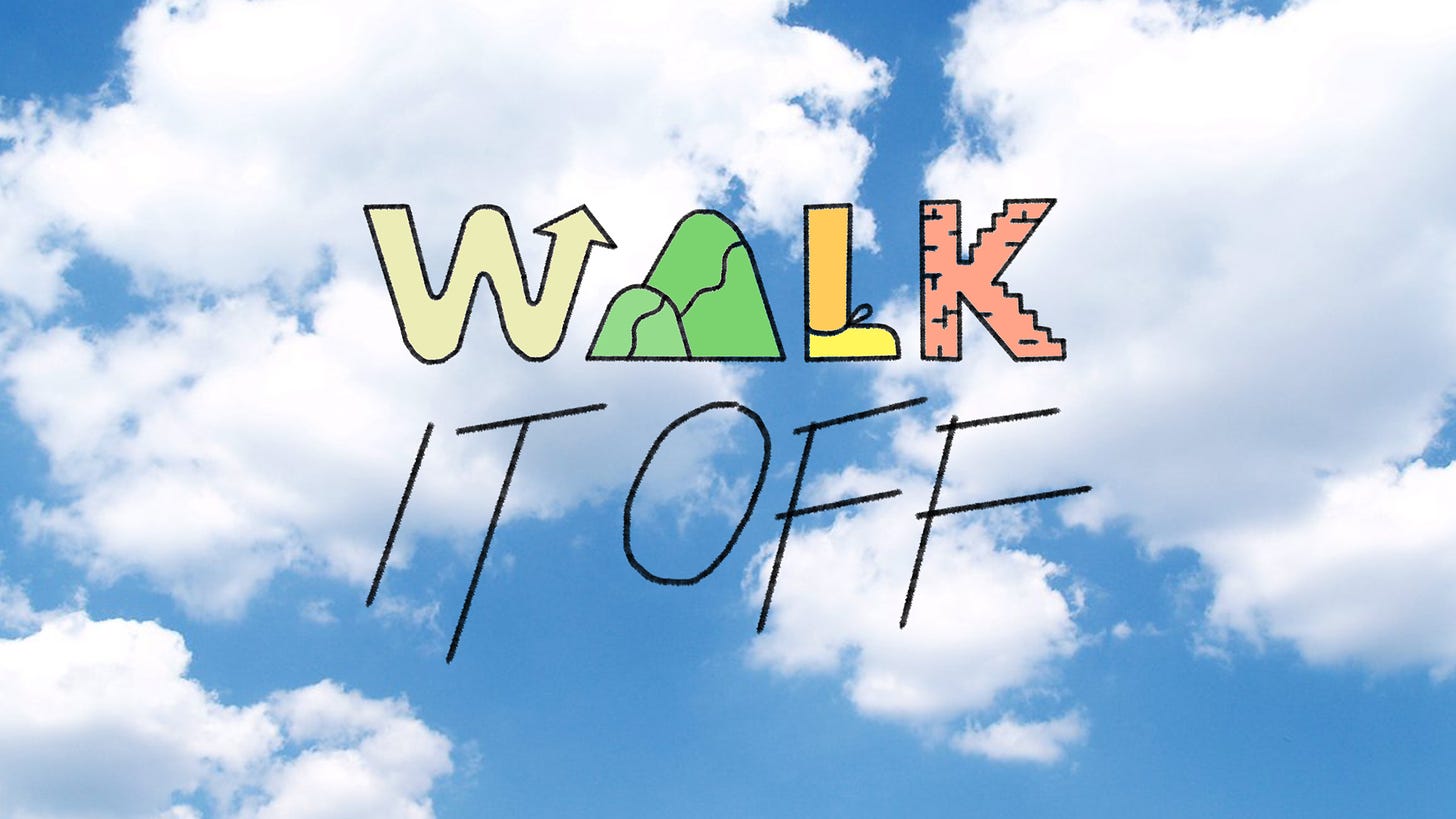
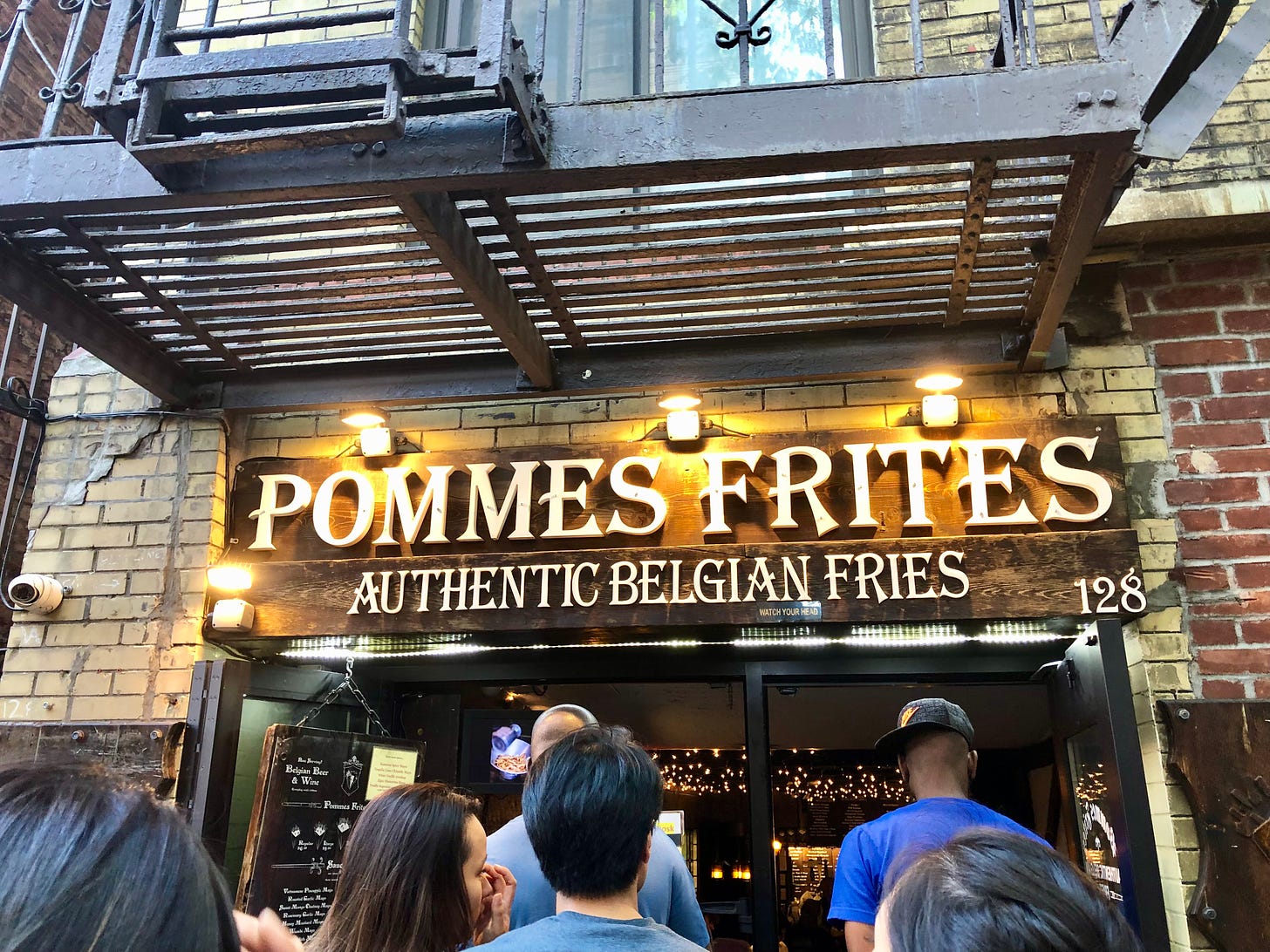
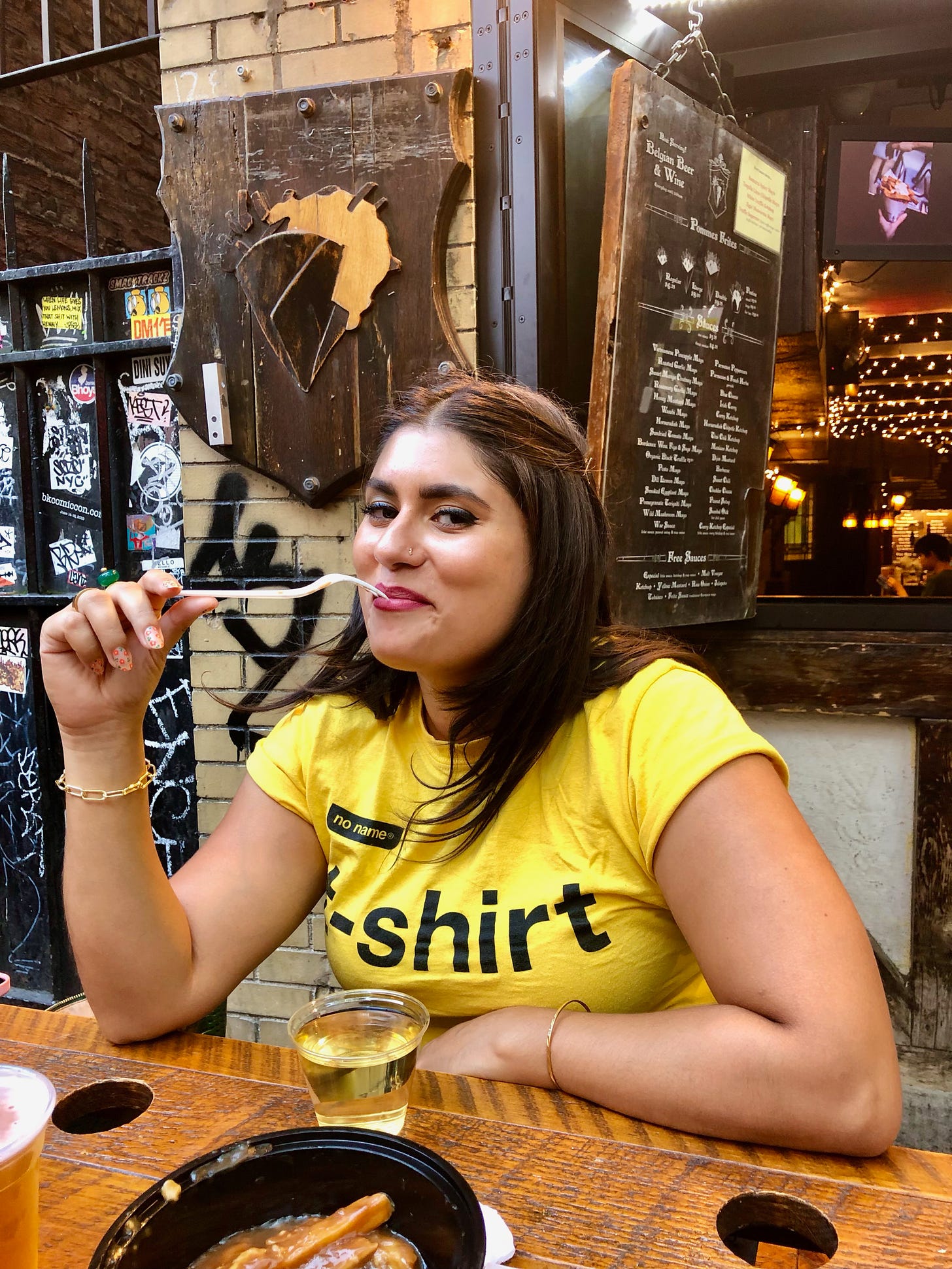

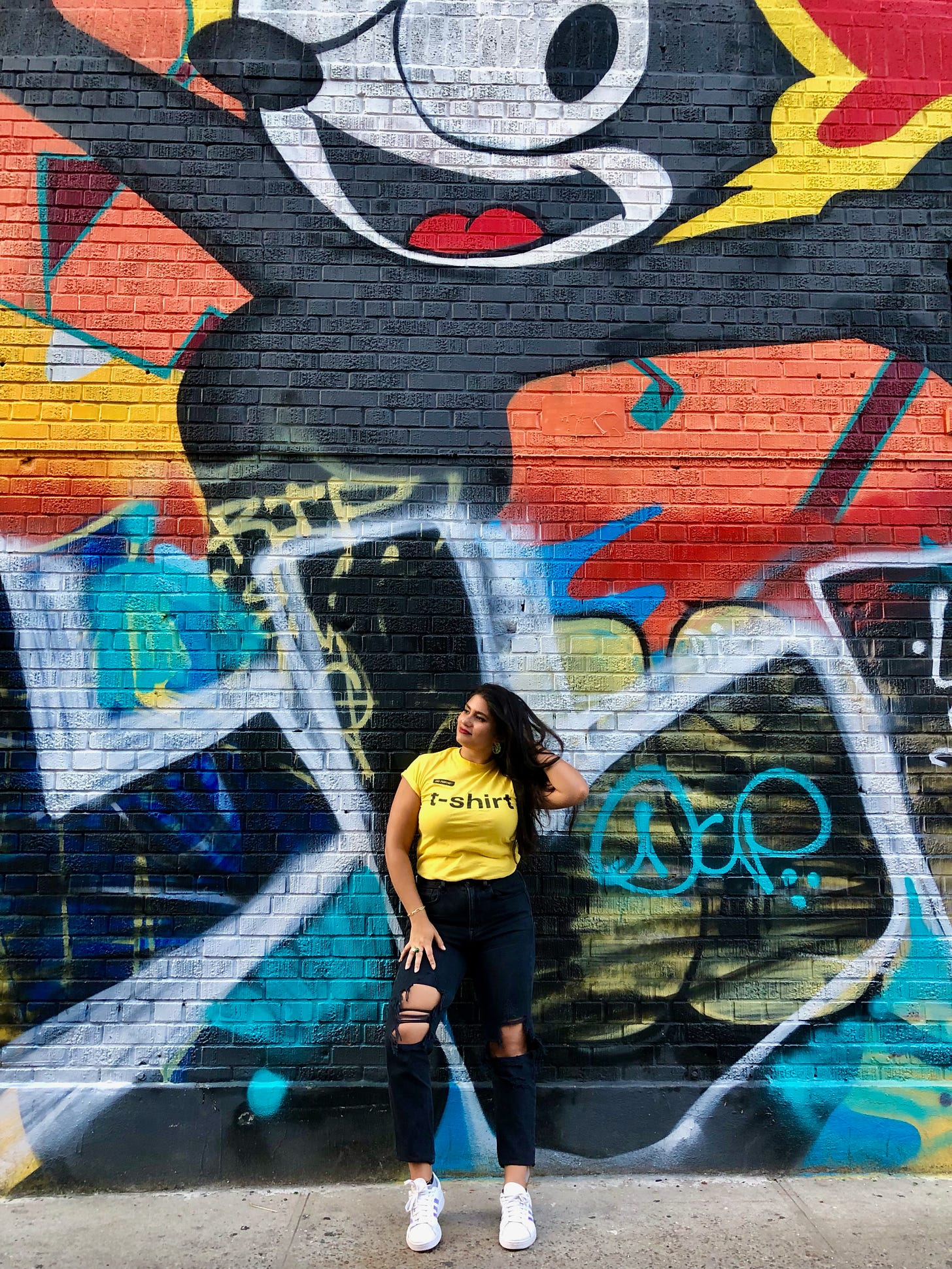

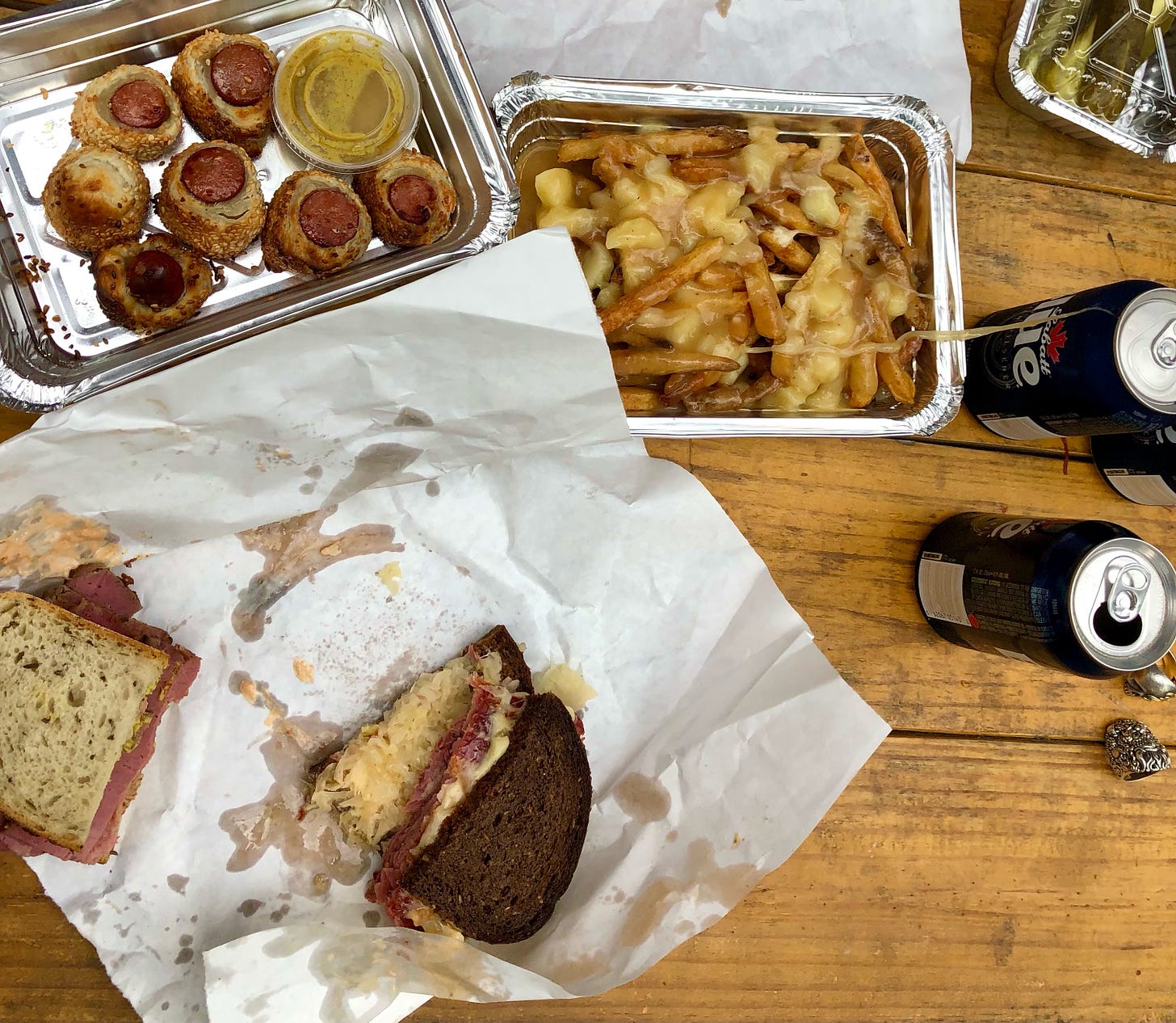
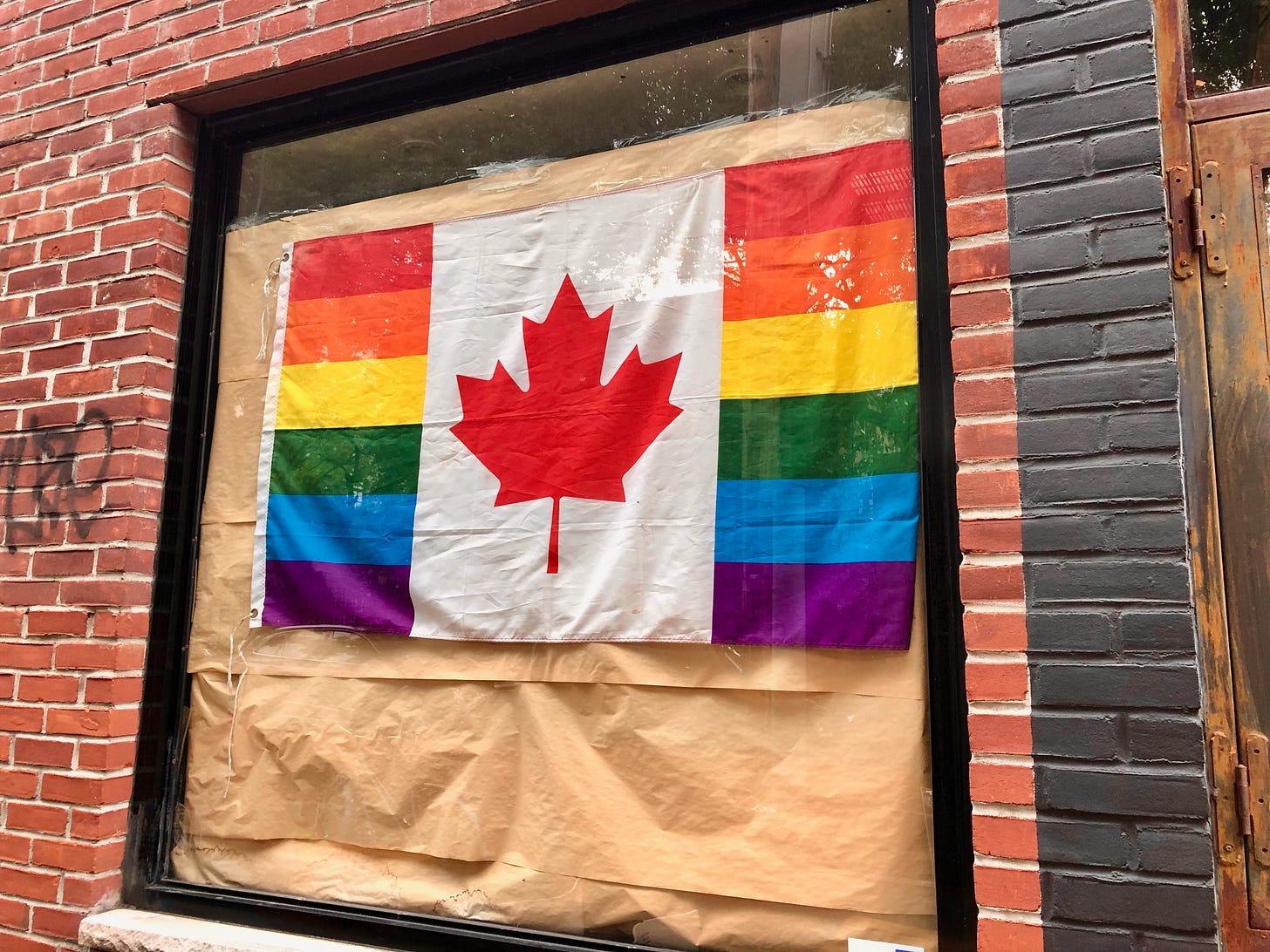
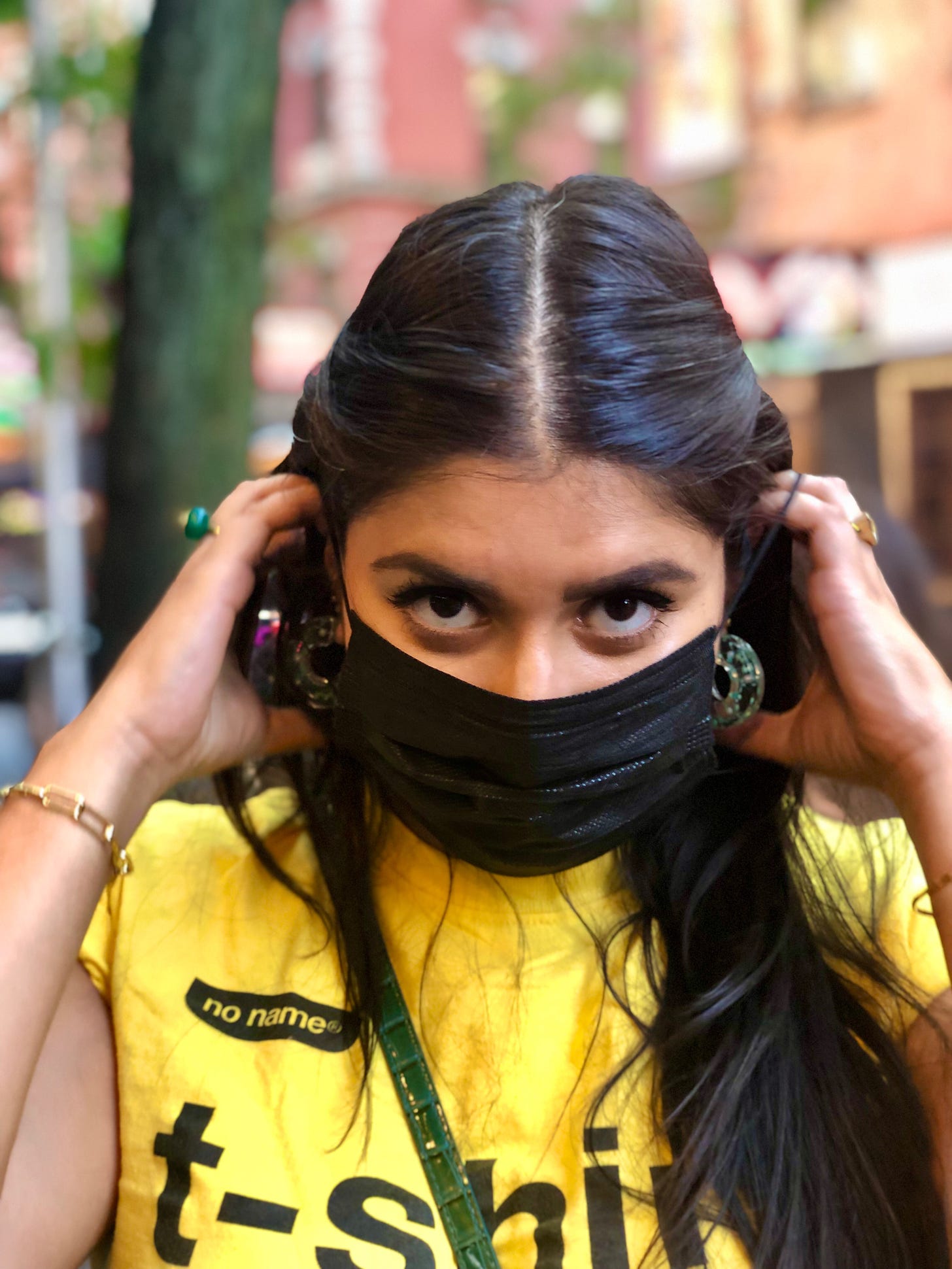
This made me tear up. I haven't seen family who are out of the country for more than 3 years now and not knowing when I can see them has been pretty disheartening. Thanks to Isaac and Scaachi for sharing their experiences and giving me words to feel all the feelings!
"You can’t have all of that happen for a year or two years and everyone is simply going to climb out of it? And want to party? Or celebrate? This is not hot girl summer. This is the desperate wanton acts of people who are trying so hard to tamp down the unbearable crushing depression that has been choking them since the beginning of 2020."
This really hit home for me as someone who got vaccinated in April and tried to resume what was considered a "normal" life - bars and parties etc. Everything felt empty and fake and wrong. Instead of hot girl summer I am now dealing with the emotional repercussions of the collective trauma we experienced since March 2020. It is comforting to know I am not alone. Thank you for this.